Football and the Great Game…World War One Some Remarkable Images
30/11/2020 - 1.00
Steve Bolton
“This Is Cousin Jimmy”
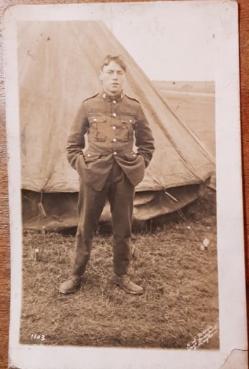
(Source: Author’s Collection)
“In an old photograph torn battered and stained…”
This is ‘Cousin Jimmy’. I’ve no idea who cousin Jimmy was. I am presuming that he was one of the ‘St Helens Pals’ regiment. What he does remind me of is the line above from the beautiful, elegiac song: “The Green Fields of France.” The photo is part of the ‘Lizzy Ashcroft Collection.’ Even more remarkably, on the back is a barely legible note (presumably from the 1920s) to my granny Lizzy Ashcroft from her youngest brother Peter and elderly sick mother in St Helens begging for ‘a few shillings’ because they have had no food in the house for a week. My granny Lizzy Ashcroft was born in Parr, St Helens to miner Ralph and Mary. There were nine siblings. She became a star footballer for the magnificent St Helens Ladies FC in April 1921 and made her debut against Stoke in front of 30,000 at St Andrews, Birmingham. St Helens were widely regarded as the second best team in 1921 and were watched by ¼ million spectators in 1921 alone. St Helens folded in 1921 due to the infamous December 5th 1921 FA ban. Fortunately, she then went on to have a magnificent 13-year career with the legendary Dick Kerr Ladies. This culminated in 1935 in her taking over the captaincy from her great friend Lily Parr and leading only the second ever tour to the continent. I was fortunate to find three suitcases in my Uncle’s old garage loft three years ago. Out of the first suitcase toppled 200 photos including the one above. I am undergoing the massive task of sorting out this treasure trove of memorabilia. There are a number of other military pictures of the various male members of the Ashcroft clan serving with the St Helens pals and with some recently discovered relatives I would like to give them the recognition they deserve.
I must admit to some shock and sadness at the images I am sharing in this short piece. This is not meant disrespectfully but it does remind me of Blackadder Goes Forth. I have heard before that true pathos can only come out of comedy and I think that Blackadder is evidence of that contention. The ‘Great Game’.... Really?
1915 Canadian Men in Their Enthusiasm to Enlist for WW1
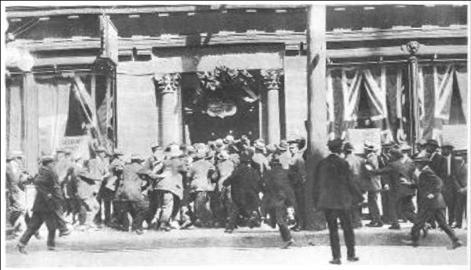
(Source: BNA Illustrated War News, Wednesday 1 September 1915 p26)
“AS IT SHOULD BE! PATRIOTIC CANADIANS “SCRUMMING” INTO A RECRUITING OFFICE AT OTTAWA IN THEIR EAGERNESS TO ENLIST”
“An excellent idea of the enthusiasm with which Canadians have answered the call of the Empire is afforded by this photograph, which shows the rush for first place on the opening of the doors of a recruiting office at the Royal Bank of Canada in Ottawa. The scene suggests a Rugby football “scrum,” or pit door at a London theatre before the days of police-regulated queues. Obviously, there is no hanging back among the young men of Canada, and their enthusiasm should set an example. Not be what there has been a splendid response to the demand for recruits in this country. Still, as we have lately been told, many more are needed, and those who have not yet come forward might well be stirred by this proof of patriotism from the great Dominion.”
1914 Footballs as ‘Suitable Gifts’ for the Men at the Front

(Source: BNA Illustrated War News, Wednesday 16 December 1914 p32)
The only text accompanying this remarkable picture is the title above. There was a great debate as to what was patriotic and what wasn’t patriotic. This was especially true for sport.
1915 The Footballers’ Battalion...

(BNA Illustrated War News, Wednesday 24 February 1915 p46)
“THE FOOTBALLERS’ BATTALION AND THE CHURCH: THE BISHOP OF BIRMINGHAM CONDUCTING A SERVICE AT THE WHITE CITY.”
“It is interesting to notice the change which has come about, since the outbreak of war, with regard to the attitude of sport-lovers in general and footballers in particular. Incidentally, it is an instance of how easy it is to be unjust in jumping at conclusions. No sport-lovers were more held up to something like contempt than those who continued to attend football matches, instead of enlisting. And now we have a Footballers’ Battalion, smart, well-set-up, and patriotically keen on their duty. The Battalion is one of the most useful of the branches of the new Army, and the Footballers are proving themselves particularly alert in shaping for their work. Our photograph shows the Battalion at a Church service conducted by the Bishop of Birmingham, Dr Russell Wakefield.”
(For more: “When the Whistle Blows: The Story of the Footballers' Battalion in the Great War” by Andrew Riddoch and John Kemp ISBN: 9781503145184)
1917 Women Footballers Get a Mention...
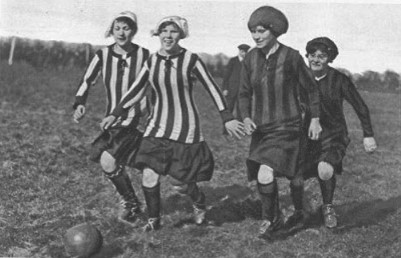
“MUNITIONERS AT PLAY”
“In the lower illustration a woman munition-workers’ football team, from the fuse-making department of a munitions factory, is shown in a match with a team from another department, the “Mechanicals”.”
1914 When Football ‘May’ be Played...

(Source: BNA Illustrated War News, Wednesday 9 September 1914 p38)
“WHEN FOOTBALL MAY BE PLAYED! BRITISH SOLDIERS HAVE A GAME AT HAVRE, WITH A FRENCH SENTRY AS SPECTATOR”
“Our illustration shows a number of British soldiers in camp at Havre having a game of football whilst waiting to go the front, with a French sentry as spectator. The Englishman’s love of sport is proverbial all the world over, and even Drake, so the story tells, finished his game of bowls before going out to fight the Spanish Armada! In England the official football “season” began on September 1, but many fixtures have been abandoned, and players under both “Rugger” and “Soccer” codes are going to the front. In Glasgow a battalion of players and football followers is to be formed, and all the football fields in the city are to be made recruiting centres. Other cities are following suit. At Cardiff sixty noted local athletes enlisted in one day.”
1914 British and French POWs Play a Match in Germany
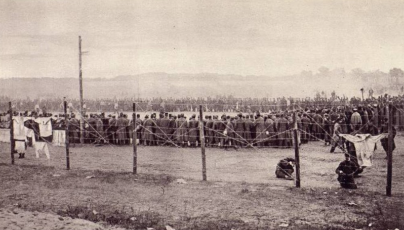
(Source: BNA Illustrated War News, Wednesday 9 December 1914 p20)
“FOOTBALL FOR PRISONERS OF WAR: BRITAIN v FRANCE IN THE GERMAN DETENTION CAMP AT DOBERITZ, NEAR BERLIN.”
“We have much about football in connection with the war, but not a great deal about the extent to which it is played within the war area and at internment camps on the Continent. But the Briton is a sportsman or nothing, and wherever he goes football, or, in summer, cricket, is sure to be not far off. It is being played in the internment camps in Holland, against sturdy Dutchmen; it is being played in our training camps at home, at the front itself, and in the prisoners’ camp at Doberitz, near Berlin. Our picture shows a well-contested match between French and British prisoners of war at Doberitz, played within barbed-wire fences; and so keen was the relief which it afforded that the whole camp turned out to witness the Battle of the Ball”
WW1 German POWs Play a Match in England
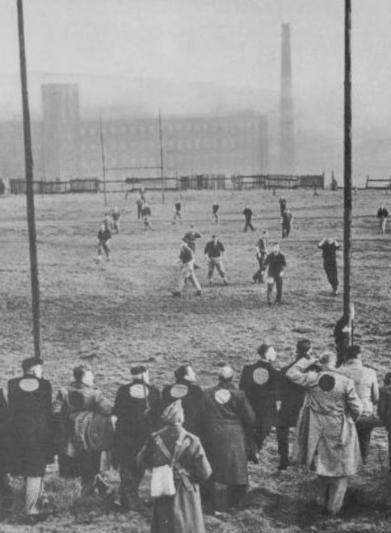
(Source: BNA Illustrated War News, Wednesday 15 November 1939 p16)
“GERMANS FOR WHOM THE WAR IS ALREADY OVER: PRISONERS OF WAR PLAYING FOOTBALL”
“Although certain prisoners of war at Donnington Hall between 1914 and 1918 made capital out of their experiences by painting adverse pictures of their life in England in post-war books, the majority of German prisoners here were fully content. Indeed, it is sometimes complained that they were better fed than our own troops in France. That enemy prisoners of war in this country are still well fed may be gathered from the physical condition and complacent expressions of the prison-cooks in the right-hand pictures. … In the photograph of the men playing football can be seen the “prisoners-of-war marking” inserted in their clothing. It is amusing to note that a British soldier is apparently refereeing!”
1917 Russian Soldiers Playing Football on Ice on the Western Front
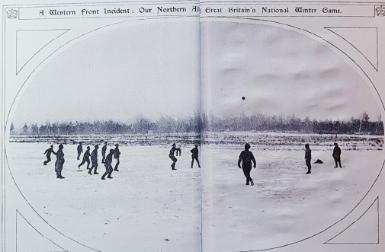
(Source: BNA Illustrated War News, Wed nesday7 March 1917 pp36-37)
“FOOTBALL ON THE SNOW-COVERED SURFACE OF A FROZEN LAKE. SOLDIERS OF A CONTINGENT IN FRANCE AT PLAY”
“This illustration shows Russian soldiers, of one of the contingents of the troops of our Northern ally on the Western Front in France, playing our British winter game during an off-duty interval. The football “ground” is the level surface of a snow-covered space across a frozen sheet of water. That football should find favour with Russians, who, like ourselves are a Northern race, is perhaps, not so very unnatural. It will, at any rate, be interesting to see what happens in regard to Russian after the war. It may well be that experimental football at the winter camps of the Russian contingents in effect may lead to the general introduction of the game in Russia as a popular pastime.”
1916 Fighting Started by Kicking a Football at the Enemy...
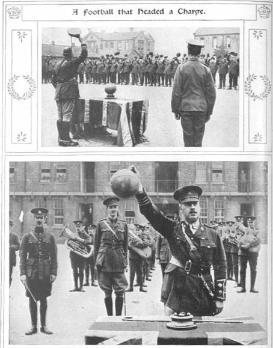
(Source: BNA Illustrated War News, Wednesday 26 July 1916 p44)
“THE EAST SURREYS’ FIGHT WITH THE PRUSSIAN GUARD: A KICK-OFF FOOTBALL HONOURED.”
“In the upper illustration the East Surreys at Kingston Barracks, and wounded from the military hospital, are seen cheering, led by Colonel HS Treeby DSO, their “chief”, at the presentation of the historic football which Captain Nevill, of the regiment, kicked off in action with the Prussian Guard during the Great Offensive. The football is on the flag-draped table before the Colonel. Below, Colonel Treeby is shown holding up the football as he addressed the men: “The gallant officer who kicked it off,” he said, “fell in front of the German trenches… it will be a fitting memorial of the devotion and sacrifice of the battalion who played the game so well and served so heroically our God, our King, and our Country.”
1915 Cricket Replaces Football in the Summer...
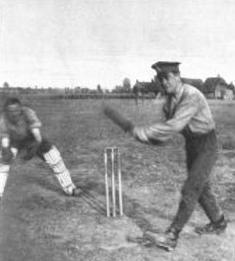
(Source: BNA Illustrated War News, Wednesday 8 September 1915 p41)
“CRICKET REPLACES FOOTBALL AT THE FRONT: BRITISH SOLDIERS IN A MATCH BEHIND THE LINES SOMEWHERE IN FRANCE, OR FLANDERS.”
“The British soldier carries with him to war his national love of games. In the autumn, winter, and spring, of course, football was in favour when the opportunity occurred, and we are publishing also a photograph showing Belgian soldiers playing it, having acquired an interest in the game from their British Allies. Even the Germans are reported to have been seen, on occasion, performing on ground beyond their trenches antics bearing some resemblance to the game. In summer, however, the thoughts of the young British soldier naturally turn to cricket, and we see here a match in progress. The photograph comes from one who took part in the game, and he adds this feeling touch, which lends interest to the batsman’s stroke: “The man playing hit the ball into my stomach!”
1916 Officers Prefer Tennis, Badminton and Polo...
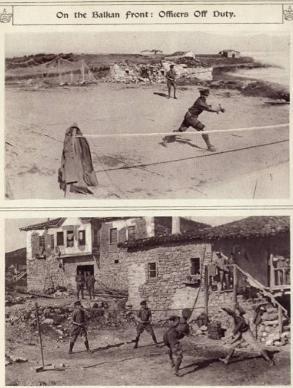
(Source: BNA Illustrated War News, Wednesday 20 December 1916 p26)
“NEAR CAMP: A THRESHING-FLOOR TENNIS COURT SHELLED OCCASIONALLY; VILLAGE BADMINTON”
“It is as much as anything as a means of keeping physically fit that British Officers everywhere turn to sport and games during off-duty time. In Mesopotamia, for instance, when they can, officers play polo, improvising sticks and borrowing transport ponies for a game. At the Dardanelles, officers joined with the men in football and cricket matches of a sort. In the upper illustration here some of the officers of units on the Balkan front are seen having a game of tennis. The court was originally a dried mud threshing-floor. Enemy shells, in fact, occasionally plump down on it - the wrecked house seen at one corner was destroyed by a shell shortly before the photograph was taken. Officers at Badminton in a Balkan village are seen in the lower picture.”
1915 Six and Out Presumably...
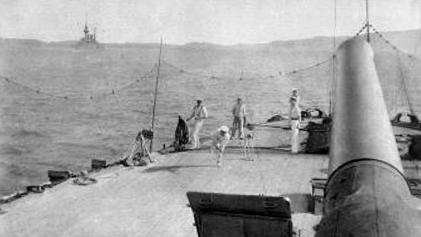
(Source: BNA Illustrated War News, Wednesday 4 August 1915 p41)
“LIFE IN THE ACTIVE BRITISH NAVY, WHILE WAITING FOR THE GERMANS: OFFICERS PLAYING CRICKET ON THE QUARTER-DECK”
“The officers and men of the British Navy have to wait long for the German Navy, but we may be sure their vigilance is not relaxed, and that when “the Day” does come, they will not be found wanting. Meanwhile, those in command know the value of recreation in keeping up the spirits of the crews. To the Germans, with their contempt for sports and games, it may seem unpardonable levity for officers to play cricket on the quarter-deck under the noses of the big guns, or for the crew to dispose themselves in the mirth-provoking antics of an obstacle race. … Some day the Germans may admit that such pastimes did not cause our men to play any the worse in the sterner game of war. As to their moral we may recall the King’s words, after his recent visit to the Grand Fleet. “I leave,” he wrote to Admiral Jellicoe, “with feelings of pride and admiration for the splendid force which you command… I realise the patient and determined spirit with which you have faced long months of waiting and hoping. I know how strong is the comradeship that links all ranks together. Such a happy state of things convinces me that whenever the day of battle comes my Navy will add fresh triumphs to its old glorious traditions.” The King knows the life of the Navy through and through, and such a tribute, coming from such a quarter, carries with it the value of expert knowledge.”
World War One - “The Great Game”

(Source: BNA Illustrated War News, Wednesday 9 August 1916 p10)
“SOLDIERS AND SPORTSMEN: BELGIAN AND BRITISH OFFICERS IN A POLO MATCH AT THE FRONT.”
“Although the old story which attributed to the Duke of Wellington the epigram that the Battle of Waterloo was won upon the Eton playing fields has long passed into the limbo of exploded legends, the spirit of sport has been very evident in the present great war, British officers, in particular, seizing upon their rest time to indulge their taste. Our pictures show a polo match being played on the Belgian Front between British and Belgian officers. There are “brave men” in the teams, but none of the “fair women” who shared in the historic ball in Brussels on the eve of Waterloo. Yet the scene is typical of the spirit in which the war is being carried on by our gallant Army and its Allies.”
The Green Fields of France
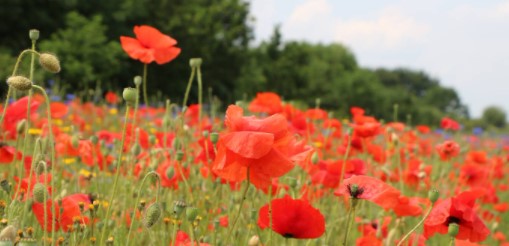
(Source: Royal British Legion)
Song
Well how do you do young Willy Mc Bride
Do you mind if I sit here down by your graveside
And rest for a while in the warm summer sun
I've been walking all day and I'm nearly done
I see by your gravestone your were only nineteen
When you joined the great falling in nineteen fifteen
Well I hope you died well and I hope you died clean
Or young Willy Mc Bride was it slow and obscene
Did they beat the drum slowly, did they sound the fifes lowly
Did they sound the death march as they lowered you down
Did the band play the last post and Did the pipes play the flowers of the forest
Did you leave a wife or a sweetheart behind
In some faithfull heart is your memory enshrined
And though you died back in nineteen fifteen
In some faith full heart are you forever nineteen
Or are you a stranger without even a name
Enshrined forever behind a glass frame
In an old photograph torn battered and stained
And fading to yellow in a brown leather frame
Well the sun now it shines on the green fields of France
There's a warm summer breeze it makes the red poppies dance
And look how the sun shines from under the clouds
There's no gas no barbed wire, there's no gun firing now…
I am not qualified to comment on the remarkable images in this article, but I did want to share them. As we come to the 11th hour of the 11th day of the 11th month I shall be having a nice glass of red wine and playing my favourite song…
Biography

Steve Bolton was awarded a BSc (Hons) in Mathematics from University College London) and a Post Graduate Certificate in Education from the University of Nottingham. Steve’s passion is researching and writing about the history of women’s football. I have had several articles published and he is currently working on his first book: “Granny Played Football”. Granny Lizzy Ashcroft was one of the most influential and important pre-WW2 women’s footballers. She made her debut at the age of 16 for St Helens Ladies at St Andrews in April 1921 in front of a crowd of 30,000. After the English FA ban she joined the Dick Kerr Ladies in 1923 where she played until her retirement in 1935. She was Vice-Captain under Lily Parr from 1932-1934 and in 1935 took over the captaincy from her great mate Lily and led the DKL only their second ever continental tour. Steve is custodian of the Lizzy Ashcroft Collection which is one of the foremost collections of pre-World War Two women’s football memorabilia in private hands.
Steve’s Twitter handle is: @STEPHEN11981196 and he can be contacted by email at: lizzyashcroftfootballer@gmail.com


/prod01/wlvacuk/media/departments/digital-content-and-communications/images-2024/240328-Varsity-Line-Up-Resized.jpg)
/prod01/wlvacuk/media/departments/digital-content-and-communications/images-18-19/220325-Engineers_teach_thumbail.jpg)
/prod01/wlvacuk/media/departments/digital-content-and-communications/images-2024/240515-Spencer-Jones-Award-Resized.jpg)
/prod01/wlvacuk/media/departments/digital-content-and-communications/images-2024/240320-Uzbekistan-Resized.jpg)
/prod01/wlvacuk/media/departments/digital-content-and-communications/images-2024/240229-The-Link-Resized.jpg)
/prod01/wlvacuk/media/departments/digital-content-and-communications/images-2024/240516-Andy-Gibson-Resized.jpg)